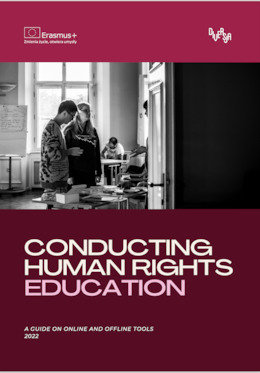Toolbox — For Training and Youth Work
All new tools in your inbox: Be the first to know about new tools for learning with our e-mail notifications.
Exercise, Manual, Info session
E-book / Conducting HRE: guide on online and offline tools
In this guide you will find both digital and non-digital tools for Human Rights Education, especially those related to Living Library method.
Aims of the tool
The aim of the e-book is to provide youth workers, especially those working with the Living Library method, with digital and non-digital tools of HRE education.
Description of the tool
The authors of the guide are 23 educators living in Belgium, Czechia, Italy, the Netherlands and Poland, among them Books, Librarians, Volunteers and Organisers of local Living Libraries.
Together they developed, implemented&tested and evaluated several methods related to Living Library and Human Rights Education in general.
What will you find in the e-book?
Available downloads:
Disclaimer
SALTO cannot be held responsible for the inappropriate use of these training tools. Always adapt training tools to your aims, context, target group and to your own skills! These tools have been used in a variety of formats and situations. Please notify SALTO should you know about the origin of or copyright on this tool.
Tool overview

http://toolbox.salto-youth.net/3241
This tool is for
Educators and youth workers, especially those working with the Living Library method.
and addresses
Social Inclusion, Disability, Anti-Racism, Intercultural Learning
It is recommended for use in:
Youth Exchanges
Training and Networking
Materials needed:
Diverse, depending on the method chosen from the guide.
Behind the tool
The tool was created by
DIVERSJA
in the context of
The methods have been developed during "Human/Living Library online" project supported by the Erasmus+ Programme
The tool has been experimented in
Training course, local activities and seminar
The tool was published to the Toolbox by
Dora Küntzel (on 22 September 2022)
and last modified
5 May 2022
Comments
No comments have been posted yet.
If you want to comment on this tool, you need to be signed in with your MySALTO account. Sign in now